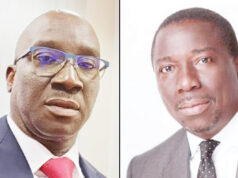 There is apprehension among residential and commercial electricity consumers across the country as the new Multi-Year Tariff Order (MYTO 2015) takes off today amid doubts over commensurate electricity supply.
There is apprehension among residential and commercial electricity consumers across the country as the new Multi-Year Tariff Order (MYTO 2015) takes off today amid doubts over commensurate electricity supply.
A meeting called by the regulator, the Nigerian Electricity Regulatory Commission (NERC) with the Manufacturers Association of Nigeria (MAN) on Friday failed to convince the manufacturers to drop their earlier opposition to the new tariff regime.
The Guardian learnt that at the meeting with NERC management, MAN insisted that its members would not discuss the tariffs because the matter was in court.
A committee was subsequently set up to discuss an out-of-court settlement.
While employers under the aegis of the Nigeria Employers’ Consultative Association (NECA) demanded an improved electricity supply, the Nigeria Labour Congress (NLC) has rejected the new tariffs.
Speaking with The Guardian in an exclusive interview, the Director General of NECA, Olusegun Oshinowo, said employers of labour were spending huge resources to power their operations, which contribute to the overall cost of production.
He said: “Well, an increase of the tariffs is not something that employers would moan about really especially if one looks at how much diesel is sold at. For us, the issue is not primarily about increment to tariffs but about the availability of electricity. If power is available, employers would spend less on their operations, which would ultimately lead to a reduction in the prices of goods and services. So, if electricity is available, employers would do much more, employ more workers and produce at cheaper rate that would benefit the economy in the long term.”
Organised labour under the aegis of the NLC has however, berated NERC’s decision to increase electricity tariffs without ensuring availability of meters to promote social justice where consumers would pay for exactly the amount of electricity they consume.
According to the Congress President, Ayuba Wabba, relying on estimated bills rips consumers off.
He said: “Congress considers as illegal, unfair, unjustifiable and a further exploitation of the already exploited Nigerians, the 45 per cent increase in electricity.”
In Ebonyi State, quarry operators have expressed dissatisfaction over exorbitant tariffs charged them by the Enugu Electricity Distribution Company (EEDC) despite epileptic electricity supply saying affecting their businesses.
In an interview with reporters at Okposi Umuoghara quarry site in Ezza North Local Council of the state, chairman of Ebonyi State Stone Crushers Association, Mr. Stanley Ugonweze, said he had written to both the federal and state governments as well as EEDC to register their unhappiness.
According to Ugonweze, each stone crushing stand receives a monthly bill ranging from N20,000 to N30,000 from EEDC, adding that they hardly ever supplied the electricity for which purpose they are being charged.
MAN President, Frank Udemba Jacob, confirmed that NERC called for a meeting and reiterated the position of manufacturers. He said: “We insist on no tariff increase. The out-of-court settlement is to enable discussions that would lead to the matter being settled out of court.”
On what out-of-court settlement could mean, he said: “ It means stopping the tariffs as directed by the court. We don’t expect to have an increase at the commencement of the new order today. We are hopeful that NERC won’t want to go ahead with the tariffs because of the subsisting court order in our favour. They can’t do that until they vacate the court order.
“We don’t expect anybody to charge us anything higher than the previous tariffs. Anything to the contrary would be contempt of court.”
Already, commercial and residential consumers are groaning under huge estimated bills, incessant outages, lack of prepaid meters and ageing equipment, among others which the 11 Distribution companies (DISCOs) have linked to the long years of neglect of the electricity sector.
They say the new tariff regime is cost reflective and would enable them to fix the existing problems.
Besides, the Discos, under the aegis of the Association of Nigerian Electricity Distributors (ANED) told The Guardian in Lagos yesterday that the capital expenditure regulated at N50 billion yearly was having a huge impact on their facility upgrade plans, urging NERC to remove such an impediment to investment.
NERC had insisted that the new tariff takes off today and that Discos must abide by its directive not to connect new customers without first providing them meters.
According to the new tariff regime, electricity consumers under the R2 Class (residential) will payN24.30 per kilowatt in Abuja; Benin-N24.08; Enugu-N27.13; Ibadan -N23.09; Jos- N26.93; Kaduna – N27.36 and N28.05 (single phase and three phases); Kano – N20.26 and N26.41; Ikeja – N21.30 and N21.80; Port Harcourt –N24.91; Eko- N24.00 and 25.79; Yola –N23.25 and N24.75 per kilowatt accordingly.
Opposition by MAN to the new order notwithstanding, Acting Head at NERC, Dr. Tony Akah, told The Guardian the tariffs take effect today in the absence of any ‘subsisting judiciary order.’
“The MYTO 2015, as sign takes effect on February 1, 2016. The commission has utmost respect for the National Assembly, Judiciary and other bodies and is working towards addressing all concerns.
“This new tariff which is based on realistic market price will improve the quality and quantity of electricity delivered to customers and provide a fair return on investment for the operators,” Akah noted
The tariff covers a 10-year period with expectations that the prices will start reducing from 2018 to 2024, when the sector must have advanced to an operational system that guarantees regular supply.
Akah said there were inbuilt consumer protection mechanisms and incentives for improved service delivery by the Discos and fair return on investment in the new tariff.
He assured that the commission in implementing the tariff would effectively monitor and enforce all service delivery agreements in the new order.
The new tariff order, aside from eliminating fixed charge has a mechanism to ensure that electricity distribution companies fully meter their consumers and eliminate “crazy” billing within one year.
Although, the new regime comes with an increase in energy charges, all electricity consumers residential as well as commercial, will no longer pay fixed charges.
For instance, residential customer classification (R2) in Abuja Electricity Distribution Company will no longer pay N702.00 fixed charge every month. Their energy charge will increase by N9.60kwh. Also, residential customers (R2 customers) in Eko and Ikeja electricity distribution areas will no longer pay N750. 00 fixed charges. They will be getting N10kwh and N8kwh increase respectively in their energy charges.
Similarly, the burden of N800.00 and N750.00 fixed charges would be lifted off the shoulders of Kaduna and Benin electricity consumers. These consumers will see an increase of N11.05kwh and N9.26kwh respectively in their energy charges.
For commercial consumers, C2 in Ibadan and Enugu will no longer pay fixed charges of N17, 010. 00 and N22,141. 00. Their energy charge will increase by N12.08kwh and N13.35kwh respectively.
The Executive Director, ANED, Sunday Oduntan, said the Discos were prepared to commence the new tariff regime, assuring that they would also step up the metering of customers in line with the NERC’s directive.
He explained that the electricity revenue would not be for Discos alone, but to be shared among the stakeholders in the sector, as Discos get 25 per cent; Regulator, bulk trader and market operators get four per cent; Transmission Company gets 11 per cent; and generation companies get 60 per cent.
But MAN’s 577 members are not impressed as they are threatening legal action to stop the new tariff taking effect from today. MAN President, Frank Udemba Jacob, who was visibly upset, told The Guardian: “We are shocked at the action of NERC and the distribution companies. We have a court injunction restraining them from any increase. We had prayed the court to ask NERC to revert to the previous Multi-Year Tariff Order (MYTO).
“This amounts to sub judice. We are going to brief our lawyers to take it up.”
Meanwhile, the Lagos Chamber of Commerce and Industry (LCCI) has expressed worry over the increase of the tariff at a time supply has not improved?”
Director-General, LCCI, Muda Yusuf, said the new tariffs were a ploy to worsen the already bad condition of businesses in the country, if crucial steps were not taken to address the problems bedevilling the power sector.
However, the Ikeja Electric in a statement yesterday assured of improved service delivery that would be commensurate with the new tariff.
It stated that, “the implementation of its new tariff structure would commence from February 1, 2016 in line with the Multi Year Tariff Order (MYTO 2.1) as approved by NERC”.
Ikeja Electric’s Head of Commercial, Mrs. Folake Soetan, said the cost reflective tariff would boost the capacity of distribution companies, strengthen the electricity value chain and improve the quality of service to customers across the nation.
According to Soetan, the new tariff would further drive Ikeja Electric’s continuing investments and expansion plans to ensure sustained excellent service delivery to all customers within its network.







